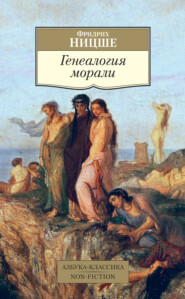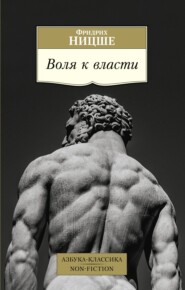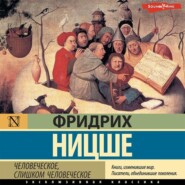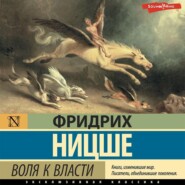По всем вопросам обращайтесь на: info@litportal.ru
(©) 2003-2024.
✖
Human, All-Too-Human: A Book For Free Spirits; Part II
Настройки чтения
Размер шрифта
Высота строк
Поля
185
Genius in Humanity. – If genius, according to Schopenhauer's observation, lies in the coherent and vivid recollection of our own experience, a striving towards genius in humanity collectively might be deduced from the striving towards knowledge of the whole historic past – which is beginning to mark off the modern age more and more as compared with earlier ages and has for the first time broken down the barriers between nature and spirit, men and animals, morality and physics. A perfectly conceived history would be cosmic self-consciousness.
186
The Cult of Culture. – On great minds is bestowed the terrifying all-too-human of their natures, their blindnesses, deformities, and extravagances, so that their more powerful, easily all-too-powerful influence may be continually held within bounds through the distrust aroused by such qualities. For the sum-total of all that humanity needs for its continued existence is so comprehensive, and demands powers so diverse and so numerous, that for every one-sided predilection, whether in science or politics or art or commerce, to which such natures would persuade us, mankind as a whole has to pay a heavy price. It has always been a great disaster to culture when human beings are worshipped. In this sense we may understand the precept of Mosaic law which forbids us to have any other gods but God. – Side by side with the cult of genius and violence we must always place, as its complement and remedy, the cult of culture. This cult can find an intelligent appreciation even for the material, the inferior, the mean, the misunderstood, the weak, the imperfect, the one-sided, the incomplete, the untrue, the apparent, even the wicked and horrible, and can grant them the concession that all this is necessary. For the continued harmony of all things human, attained by amazing toil and strokes of luck, and just as much the work of Cyclopes and ants as of geniuses, shall never be lost. How, indeed, could we dispense with that deep, universal, and often uncanny bass, without which, after all, melody cannot be melody?
187
The Antique World and Pleasure. – The man of the antique world understood better how to rejoice, we understand better how to grieve less. They continually found new motives for feeling happy, for celebrating festivals, being inventive with all their wealth of shrewdness and reflection. We, on the other hand, concentrate our intellect rather on the solving of problems which have in view painlessness and the removal of sources of discomfort. With regard to suffering existence, the ancients sought to forget or in some way to convert the sensation into a pleasant one, thus trying to supply palliatives. We attack the causes of suffering, and on the whole prefer to use prophylactics. – Perhaps we are only building upon a foundation whereon a later age will once more set up the temple of joy.
188
The Muses as Liars. – “We know how to tell many lies,” so sang the Muses once, when they revealed themselves to Hesiod. – The conception of the artist as deceiver, once grasped, leads to important discoveries.
189
How Paradoxical Homer can be. – Is there anything more desperate, more horrible, more incredible, shining over human destiny like a winter sun, than that idea of Homer's:
“So the decree of the Gods willed it, and doomed man to perish, that it might be a matter for song even to distant generations”?
In other words, we suffer and perish so that poets may not lack material, and this is the dispensation of those very Gods of Homer who seem much concerned about the joyousness of generations to come, but very little about us men of the present. To think that such ideas should ever have entered the head of a Greek!
190
Supplementary Justification of Existence. – Many ideas have come into the world as errors and fancies but have turned out truths, because men have afterwards given them a genuine basis to rest upon.
191
Pro and Con Necessary. – He who has not realised that every great man must not only be encouraged but also, for the sake of the common welfare, opposed, is certainly still a great child – or himself a great man.
192
Injustice of Genius. – Genius is most unjust towards geniuses, if they be contemporary. Either it thinks it has no need of them and considers them superfluous (for it can do without them), or their influence crosses the path of its electric current, in which case it even calls them pernicious.
193
The Saddest Destiny of a Prophet. – He has worked twenty years to convince his contemporaries, and succeeds at last, but in the meantime his adversaries have also succeeded – he is no longer convinced of himself.
194
Three Thinkers like one Spider. – In every philosophical school three thinkers follow one another in this relation: the first produces from himself sap and seed, the second draws it out in threads and spins a cunning web, the third waits in this web for the victims who are caught in it – and tries to live upon this philosophy.
195
From Association with Authors. – It is as bad a habit to go about with an author grasping him by the nose as grasping him by the horn (and every author has his horn).
196
A Team of Two. – Vagueness of thought and outbursts of sentimentality are as often wedded to the reckless desire to have one's own way by hook or by crook, to make oneself alone of any consequence, as a genuinely helpful, gracious, and kindly spirit is wedded to the impulse towards clearness and purity of thought and towards emotional moderation and self-restraint.
197
Binding and Separating Forces. – Surely it is in the heads of men that there arises the force that binds them – an understanding of their common interest or the reverse; and in their hearts the force that separates them – a blind choosing and groping in love and hate, a devotion to one at the expense of all, and a consequent contempt for the common utility.
198
Marksmen and Thinkers. – There are curious marksmen who miss their mark, but leave the shooting-gallery with secret pride in the fact that their bullet at any rate flew very far (beyond the mark, it is true), or that it did not hit the mark but hit something else. There are thinkers of the same stamp.
199
Attack from Two Sides. – We act as enemies towards an intellectual tendency or movement when we are superior to it and disapprove of its aim, or when its aim is too high and unrecognisable to our eye – in other words, when it is superior to us. So the same party may be attacked from two sides, from above and from below. Not infrequently the assailants, from common hatred, form an alliance which is more repulsive than all that they hate.
200
Original. – Original minds are distinguished not by being the first to see a new thing, but by seeing the old, well-known thing, which is seen and overlooked by every one, as something new. The first discoverer is usually that quite ordinary and unintellectual visionary – chance.
201
Error of Philosophers. – The philosopher believes that the value of his philosophy lies in the whole, in the structure. Posterity finds it in the stone with which he built and with which, from that time forth, men will build oftener and better – in other words, in the fact that the structure may be destroyed and yet have value as material.
202
Wit. – Wit is the epitaph of an emotion.
203
The Moment before Solution. – In science it occurs every day and every hour that a man, immediately before the solution, remains stuck, being convinced that his efforts have been entirely in vain – like one who, in untying a noose, hesitates at the moment when it is nearest to coming loose, because at that very moment it looks most like a knot.
204
Among the Visionaries. – The thoughtful man, and he who is sure of his intelligence, may profitably consort with visionaries for a decade and abandon himself in their torrid zone to a moderate insanity. He will thus have travelled a good part of the road towards that cosmopolitanism of the intellect which can say without presumption, “Nothing intellectual is alien to me.”
205
Keen Air. – The best and healthiest element in science as amid the mountains is the keen air that plays about it. – Intellectual molly-coddles (such as artists) dread and abuse science on account of this atmosphere.
206
Why Savants are Nobler than Artists. – Science requires nobler natures than does poetry; natures that are more simple, less ambitious, more restrained, calmer, that think less of posthumous fame and can bury themselves in studies which, in the eye of the many, scarcely seem worthy of such a sacrifice of personality. There is another loss of which they are conscious. The nature of their occupation, its continual exaction of the greatest sobriety, weakens their will; the fire is not kept up so vigorously as on the hearths of poetic minds. As such, they often lose their strength and prime earlier than artists do – and, as has been said, they are aware of their danger. Under all circumstances they seem less gifted because they shine less, and thus they will always be rated below their value.
207
How Far Piety Obscures. – In later centuries the great man is credited with all the great qualities and virtues of his century. Thus all that is best is continually obscured by piety, which treats the picture as a sacred one, to be surrounded with all manner of votive offerings. In the end the picture is completely veiled and covered by the offerings, and thenceforth is more an object of faith than of contemplation.
208
Standing on One's Head. – If we make truth stand on its head, we generally fail to notice that our own head, too, is not in its right position.

















